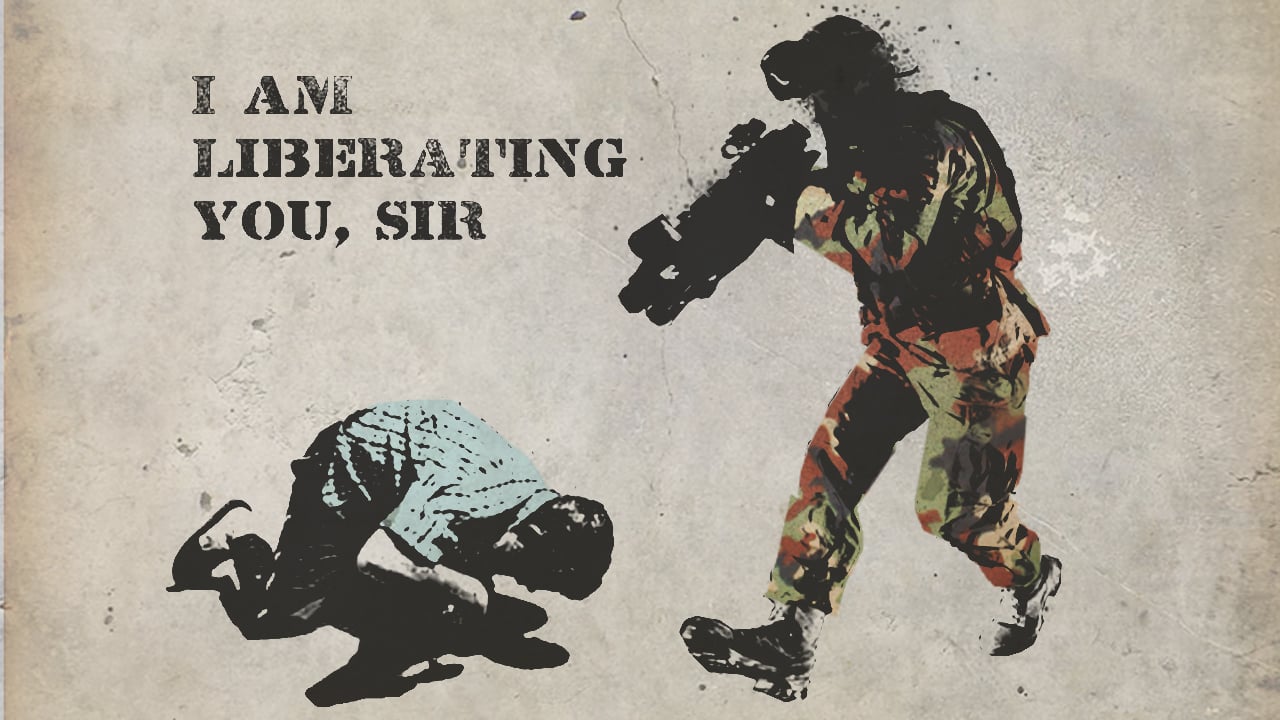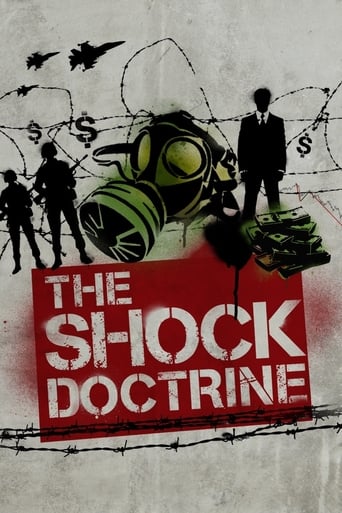

This is a movie you should check out. Aristotle said that "It is the mark of an educated mind to be able to entertain a thought without accepting it." Well, going back to the start of the review, even if you think that what Naomi Klein is talking about is pure nonsense, "The Shock Doctrine" is a movie to watch, precisely even more if you don't agree with the ideas it presents.Basically the movie talks about how capitalism aliments itself on conflict and shocks, meaning that it is very good at distracting the attention from the important to some event that is terrible, but not the most terrible. For example, it talks about how the United Kingdom got into the Falklands War, and how that distracted public attention from the strikes and the civil unrest that was ongoing in the country. Does it all sound a little bit conspiratorial? It does, but it is also true that when something like a war happens, people's attention will be centered on that event, and it will become a situation of "us" vs. "others". Even if you don't believe that happens on purpose, it is true that systems, being it capitalism or other, may take advantage of those situations.But that's for a politics or international relations class. Going back to the documentary, "The Shock Doctrine" presents its ideas in a very clear and easy to understand way, and it gives enough examples to see why they say what they say. In that respects it does a very nice job. It also does a good job in making the viewer think and analyze situations. And it is very interesting to try to see things in a different light from the "official" view of things.As Aristotle said, you don't have to accept it. Or agree with it. But it doesn't hurt to think.
... View MoreThis formidable movie based on Naomi Klein's mightily important book, explains how the financial 'elite' uses shocks (crises) for implementing its 'free market' gospel, or, better, to increase its economic power and concomitantly its own financial interests.Economics (general shocks) In his mightily important book 'The Secrets of the Federal Reserve', E. Mullins reveals how the financial 'elite' manipulated market prices and provoked the Wall Street Crash of 1929. What they didn't foresee was the gigantic economic slump and the massive unemployment that would follow the crash. The US government had to intervene in the economy with a 'New Deal': breaking up the banking system and impose regulations and governmental interventions in the economy. The 'New Deal' weakened significantly the grip of the financial oligarchy on the US economy. The 'free market' gospel propagated by the Chicago School of Economics (Milton Friedman) is nothing less than a frontal attack on the legislation provided by the New Deal. The gospel defends deregulation and privatization of the economy instead of regulation and governmental intervention (through its institutions and enterprises). The gospel tries to prove and to justify that free market policies (the old order) are far better than those imposed by a government. The implementation of a deregulated and privatized (by selling off government possessions) economy was first tested in Chile and Argentina after military coups (shocks). It didn't work. The deregulation of the US financial system ended in a worldwide financial collapse of the banking system, which had to be bailed out by governmental intervention (the people's money) at a staggering cost of thousand of billions of dollars worldwide, a mind-boggling anti-shock treatment. Psychiatrics, psychology (personal shocks) The movie starts with the experiments of Ewen Cameron on psychiatric patients in Canada. He tried to control (break) the minds and to reprogram (clear) the psyche of his patients with electroshocks and drugs. His methods are now used on political prisoners ('terrorists'). By creating shocks (heavy bombardments, grotesque lies, false flag operations) and also after 'natural' shocks (floods) the 'elite' tries to instill fear into the population in order to control their will, to implement their policies and, in fine, to prevent or to obstruct the establishment or the functioning of a real democracy.Reactions Reactions against 'elite' shock doctrine policies must come from 'below', from the people, whose money was squandered in order to bail out the reckless speculations of 'too big to fail' mentalities. The solution will not come from those who want to 'fight' climate change by commodifying the atmosphere (trading carbon dioxide emissions).This movie and its extras are a must see for all those who want to understand the world we live in.
... View MoreShameless propaganda. Naomi Klein is an activist, with no economic or business understanding whatsoever. It is a shame that in modern times a primitive, incredibly biased and ignorant work like the "shock doctrine" can be a bestseller. She denounces capitalism (a system the vast majority of countries are using in the world: China, Russia included) which has helped so many poor countries escape the shackles of failed socialist economics (only North Korea and Cuba remain - see how those are doing), like it is some sort of bogeyman. Clearly, she has never had a course in development nor macro economics - and yet she is somehow supposed to be this great visionary? What a joke.But most annoyingly she accuses Milton Friedman of being responsible for the actions of the Pinochet regime. That's like accusing Henry Ford for drunk people dying in car accidents, or accusing Chinese for all the paper cuts in the world. It's actually even worse, since how the economy is structured has nothing to do with how oppressive the government is. What is most shameful, however, is that she never actually bothered to research that Milton Friedman was a person who promoted personal freedom and liberty to people above all, and that he personally resented what the Pinochet regime did. (though most likely she did, but just lied)A shameless propaganda, that insults Milton Friedman, accuses him of doing something he never did. A economic failure of a book/movie. Naomi Klein is either incredibly ignorant, or pathetically black-hearted to lie in such a way.
... View MoreThe adaptation of Naomi Klein's book 'The Shock Doctrine' seems to have been quite convoluted. First Alfonso Cuarón and his brother teamed up with Klein to make a 6 minute short film almost as a way of advertising the book. This is just a taster for the larger issue at hand. Whitecross and Winterbottom's feature-length documentary is a journey into the meat of the matter. Each of the snippets from Cuarón's film are expanded and the story is told over a grand, even epic, scale. This is the story of an economist called Milton Friedman and his idea. Perhaps not just an idea, given the remarkable effect of Friedman's 'idea' it just doesn't seem like a big enough word, but it will have to do. The idea is one that sounds attractive, it is beguiling in its simplicity and more than that, it offers the chance of a kind of utopia - it is the notion of the 'Free Market'. Klein's book, and this film, describe how Friedman's ideas on Free Market economics went from being a marginalised backwater of economic theory to being the reasoning behind so many international events in recent years. It is the story of how deregulated trading isn't a Utopian saviour but a dangerous and unpredictable beast powerful enough to bring a country to its knees.The argument is drawn clearly and with enough evidence to be compelling; from the military coups in Chile and Argentina through the right wing governments of Thatcher and Reagan, a stop off with Boris Yeltsin and the collapse of the Soviet Union and ending with our current embroilment in Iraq – Naomi Klein has drawn a path connecting all these events to the economic ideas of Milton Friedman. At points the power of the message is a little overwhelming, it made me angry to see the atrocities committed in the service of enacting national changes. To see the rich get rich and the poor, well the poor get eaten up by the system. It is horrible and brilliant. Sickening and yet so very clever, so smart as to be almost admirable – but that doesn't make it right. They are preaching to the converted with me, but I urge you to seek out this film. Find it and watch it and understand some of the underlying ideas that run our lives on a day to day and nation to nation basis. A word of warning though, you might get angry.
... View More